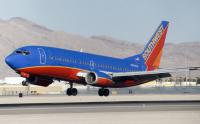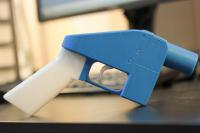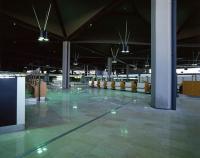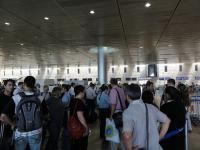-
Bermuda Triangle mystery may have been solved
It is estimated that over the last 100 years, hundreds of ships, at least 75 planes, and thousands of lives have been lost art the Bermuda Triangle. A group of satellite meteorologists may have solved the mystery of the triangle: Hexagonal clouds, creating “air-bombs” with winds of up to 170mph, capable of plunging planes into the sea and flipping ships, are said to be behind the mysterious disappearances at sea.
-
-
Numbers count: Public interested in plane crashes only if death toll is 50 or higher
Data reveal which plane crashes the public is interested in and why. Researchers counted the number of page views and edits of Wikipedia articles about 1,500 plane crashes around the world to discover that a death toll of around fifty is the minimum threshold for predicting significant levels of public interest. The data also show that the amount of interest in the relevant articles accelerates in line with the numbers who died.
-
-
No GPS, no problem: Next-gen navigation
Researchers have developed a highly reliable and accurate navigation system that exploits existing environmental signals such as cellular and Wi-Fi, rather than the Global Positioning System (GPS). The technology can be used as a standalone alternative to GPS, or complement current GPS-based systems to enable highly reliable, consistent, and tamper-proof navigation. The technology could be used to develop navigation systems that meet the stringent requirements of fully autonomous vehicles, such as driverless cars and unmanned drones.
-
-
Southwest Airlines, police remove Muslim from plane for saying “inshallah”

Khairuldeen Makhzoomi, a 26-year-old Berkeley graduate, was removed from a Southwest Airline plane at Los Angeles International Airport in April this year — after another passenger overheard him speaking Arabic on his mobile phone. He was escorted off the plane by police officers, searched, and dogs sniffed his luggage. The Department of Transportation is investigating. “This is our home,” he said of the United States (he came here legally in 2010). “We don’t have another home. The experience [in April] was just unpleasant,” he said.
-
-
New inquiry into 2010 Smolensk plane crash suggests collusion between governments of Poland, Russia
A new Polish commission, set up to investigating anew the 2010 plane crash which killed President Lech Kaczyński and ninety-five others, has released its report, accusing the previous investigative commission, which did its work in 2011, of doctoring evidence and documents and manipulating facts. The 2011 commission attributed the crash to errors by the Polish pilots who tried to land the plane in dense fog. The new commission, appointed by Kaczyński’s twin brother, who now leads Poland’s nationalist government, hints that the crash may have been the result of a collusion between the Polish government at the time and Russia.
-
-
Freight airships may soon help Asian companies reach world markets
The rise of freight airships could go down like a lead balloon with traditional aircraft companies, but could also represent a new high for Asian companies seeking to exploit new ways to reach world markets. Researchers explain how the reinvented technology of airships has come apace in recent years and is a far cry from the trial and error methods and primitive materials used to build the giant Zeppelins of yesteryear.
-
-
Technical problems rather than operator errors cause most drone accidents
Research has found that technical problems rather than operator errors are behind the majority of drone accidents, leading to a call for further safeguards for the industry. One of the researchers said the findings illustrated the need for further airworthiness requirements for Remotely Piloted Aircraft Systems (RPAS), as well as the mandatory reporting of all accidents or incidents. “Understanding what happens to drones, even those that don’t cause damage to people or property, is essential to improve safety,” he said.
-
-
3-D printed plastic gun discovered at Nevada airport

Airport screening agents at Reno-Tahoe International Airport in Nevada last week confiscated a plastic handgun produced with a 3-D printer from a man’s carry-on luggage. Federal official said Wednesday this might have been the first time a 3D-made gun was discovered as a passenger was trying to bring it on board. Airport authorities said the white gun was loaded with five .22-caliber bullets, but that it was a replica that could not fire and.
-
-
Can next-generation bomb ‘sniffing’ technology outdo dogs on explosives detection?
With each terrorist attack on another airport, train station, or other public space, the urgency to find new ways to detect bombs before they’re detonated ratchets up. What researchers have wanted to develop for a long time is a new chemical detection technology that could “sniff” for explosives vapor, much like a canine does. Many efforts over the years fell short as not being sensitive enough. My research team has been working on this problem for nearly two decades – and we’re making good headway. Inspired by the tremendous detection capabilities of dogs, we’ve made remarkable advances toward developing technology that can follow in their footsteps. Deploying vapor analysis for explosives can both enhance security levels and provide a less intrusive screening environment. Continuing research aims to hone the technology and lower its costs so it can be deployed at an airport near you.
-
-
Turkey identifies the three terrorists as a Russian, Uzbek, and Kyrgyz
Turkish security officials have said that the three terrorists who attacked the Istanbul airport were foreign nationals – a Russian, Uzbek, and Kyrgyz. The officials, who spoke with Western news agencies, said that investigators faced difficulties identifying the bombers from their limited remains, but a pro-government Turkish newspaper had said the Russian bomber was from Dagestan, a restless province which borders Chechnya.
-
-
41 killed, 239 injured in three suicide explosions at Istanbul Atatürk airport

Turkish authorities say that forty-one people have been killed and 239injured in a terrorist attack on Turkey’s largest airport, Istanbul Atatürk. The airport is Europe’s third busiest airport. The Turkish Ministry of Justice said that two terrorists blew themselves up outside the security checkpoint at the entry to the international terminal. A third terrorist blew himself up in the terminal’s parking lot. Recent months have seen an increase in terrorist attacks against Turkish civilians. These attacks have been carried out by both ISIS Islamists and PKK Kurdish separatists.
-
-
Lawmakers call for lifting “arbitrary,” “illogical” cap on the number of airport screeners
The American Federation of Government Employees (AFGE), the union representing Transportation Security Officers (TSOs) at U.S. airports, says recent Congressional actions to reduce passenger wait times are a good step but that the permanent solution remains hiring an additional 6,000 full-time screeners.
-
-
The security effectiveness of TSA’s expedited screening can be improved: GAO
In 2015, the Transportation Security Administration (TSA) screened or oversaw the screening of more than 708 million passengers at more than 450 U.S airports. In two recent reports, the GAO addresses the extent to which TSA (1) has taken steps to improve the security effectiveness of expedited screening, and (2) uses screening personnel (TSO) performance testing data to enhance TSO performance in screening for prohibited items.
-
-
Data contained in the black boxes should be stored in the cloud: Expert
Researcher in the field of networked electronic and radio systems say information stored in an aircraft’s flight data recorder (FDR) and cockpit data recorder (CDR) — the so-called black boxes — should be streamed to a safe cloud storage facility.
-
-
Airport executives from forty countries to visit Israel for security lessons

With concern rising after a string of terror attacks, airport representatives from forty countries will visit Israel’s Ben-Gurion International Airport next month to learn about Ben-Gurion’s security procedures. Ben-Gurion is one of the world’s safest airports — no flight departing Israel has ever been hijacked, and there has not been a terrorist attack at Ben-Gurion since 1972.
-
More headlines
The long view
New Technology is Keeping the Skies Safe
DHS S&T Baggage, Cargo, and People Screening (BCP) Program develops state-of-the-art screening solutions to help secure airspace, communities, and borders
